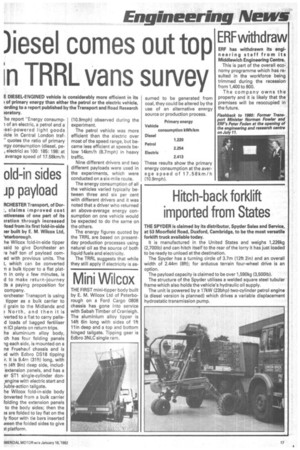)1esel comes out top E"
Page 13

If you've noticed an error in this article please click here to report it so we can fix it.
in TRRL vans survey
E DIESEL-ENGINED vehicle is considerably more efficient in its of primary energy than either the petrol or the electric vehicle, iording to a report published by the Transport and Road Research ioratory.
'he report "Energy consumpof an electric, a petrol and a isel-powered light goods iicle in Central London traf" quotes the ratio of primary )rgy consumption (diesel, pe, electric) as 100: 185: 198: at average speed of 17.58km/h (10.9mph) observed during the experiment.
The petrol vehicle was more efficient than the electric over most of the speed range, but became less efficient at speeds below 14km/h (8.7mph) in heavy traffic.
Nine different drivers and two different payloads were used in the experiments, which were conducted on a six-mile route.
The energy consumption of all the vehicles varied typically between three and six per cent with different drivers and it was noted that a driver who returned an above-average energy consumption on one vehicle would be expected to do the same on the others.
The energy figures quoted by the TRRL are based on presentday production processes using natural oil as the source of both liquid fuels and electricity.
The TRRL suggests that while they still apply if electricity is as sumed to be generated from coal, they could be altered by the use of an alternative energy source or production process.










































